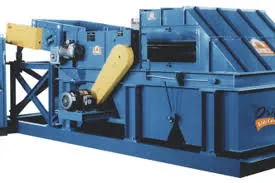

Nov . 24, 2024 02:03 Back to list
The Importance of Aluminum Recycling Plants
In the face of increasing environmental challenges and the urgent need for sustainable practices, aluminum recycling plants play a pivotal role in the circular economy. With aluminum being one of the most widely used metals in various industries—from packaging and transportation to construction and electronics—establishing efficient recycling systems is crucial for conserving natural resources, reducing energy consumption, and minimizing waste.
The Process of Aluminum Recycling
The aluminum recycling process begins with the collection of scrap aluminum. This can come from various sources, including industrial manufacturing waste, used packaging (like cans and foil), and old products such as cars and appliances. Once collected, the scrap aluminum is transported to recycling plants, where it undergoes a thorough sorting process.
At the recycling plant, aluminum is separated from other materials through a combination of manual labor and advanced technology, including magnetic separation and optical sorting. This ensures that only pure aluminum reaches the next stage of the process. Once sorted, the aluminum is shredded into small pieces, which facilitates the melting process.
The next step involves melting the shredded aluminum in large furnaces. This requires significantly less energy compared to producing aluminum from raw bauxite ore; in fact, recycling aluminum uses about 95% less energy. The molten aluminum is then poured into molds to create ingots, which can be sold to manufacturers for the production of new aluminum products. This closed-loop system not only saves energy but also reduces greenhouse gas emissions associated with aluminum production.
Environmental Benefits
The environmental benefits of aluminum recycling are substantial. By recycling aluminum instead of producing it from scratch, we can vastly reduce mining activities and the associated ecological damage. Mining bauxite, the primary ore of aluminum, involves deforestation, habitat destruction, and significant water use. Recycling alleviates pressure on these natural resources and helps protect ecosystems.
Moreover, aluminum recycling significantly cuts down on energy consumption. The production of new aluminum from raw materials is energy-intensive and generates considerable greenhouse gas emissions. In contrast, recycled aluminum production minimizes the carbon footprint and contributes to combating climate change. A study indicates that recycling one ton of aluminum can save up to 9 metric tons of carbon dioxide emissions, showcasing the substantial impact that aluminum recycling can have on our environment.

Economic Advantages
In addition to environmental benefits, aluminum recycling plants also contribute positively to the economy. They create jobs in collection, sorting, processing, and manufacturing areas. The recycling industry is labor-intensive, providing employment opportunities in regions where such jobs may be limited. Furthermore, recycling aluminum creates a valuable market for scrap materials, driving economic growth and encouraging more businesses to engage in sustainable practices.
The economic benefits extend to consumers as well. As manufacturers adopt recycled aluminum, they can often reduce production costs, which can lead to lower retail prices for end products. This creates a win-win situation where consumers can make environmentally friendly choices without incurring higher costs.
Future of Aluminum Recycling
As the world transitions towards more sustainable practices, the future of aluminum recycling looks promising. Innovations in recycling technology are continually being developed to improve efficiency and reduce contamination in the recycling stream. Moreover, public awareness of recycling's importance is on the rise, prompting more individuals and businesses to advocate for and participate in recycling programs.
Governments around the globe are also recognizing the necessity of supporting recycling initiatives through legislation and financial incentives. Policies that promote recycling, combined with regulations to minimize waste, will play an essential role in advancing the aluminum recycling industry and fostering sustainable practices.
Conclusion
Aluminum recycling plants are a crucial component of environmental sustainability, offering numerous benefits ranging from energy conservation and greenhouse gas reduction to economic growth. As we continue to face the challenges of climate change and resource depletion, the importance of recycling aluminum—and the critical role of aluminum recycling plants—cannot be overstated. By supporting recycling efforts, we not only protect our environment but also pave the way for a sustainable future that benefits both people and the planet. With ongoing advancements and greater societal commitment, the aluminum recycling industry is poised to lead the charge in the pursuit of a circular economy.
Latest news
eddy-separator-for-non-ferrous-metals
NewsAug.22,2025
e-waste-bin-for-collected-spray-cans-sustainable-disposal-solutions
NewsAug.22,2025
dual-shaft-shredder-with-adjustable-blade-gaps
NewsAug.22,2025
hammer-crusher-machine-with-secondary-crushing
NewsAug.22,2025
copper-granulator-our-promise-of-recycling-excellence
NewsAug.22,2025
industrial-shredders-crafted-for-e-waste-recycling
NewsAug.22,2025